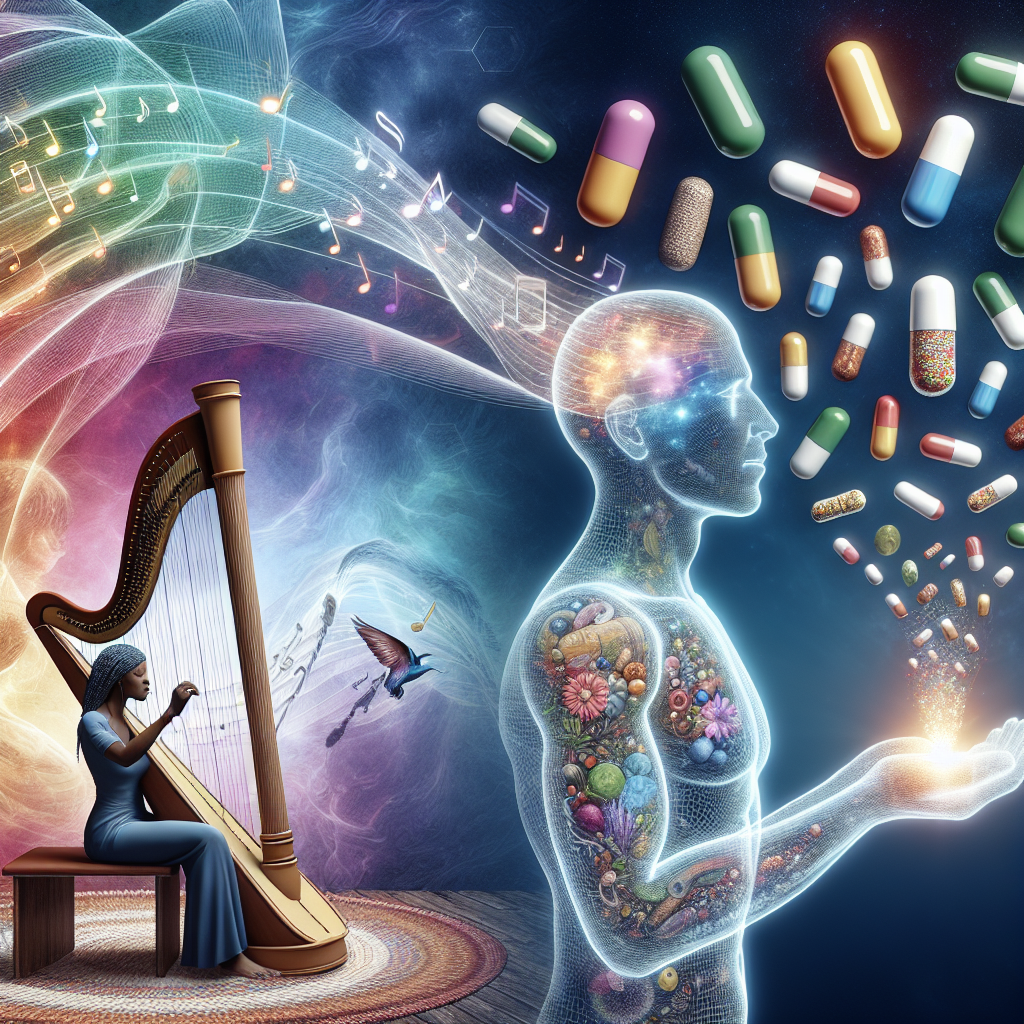How Music Therapy and Vitamins Work Together for Healing

Discover how music therapy and vitamins work together for healing. Uncover the power of this unique combination and how it can enhance your overall well-being. Visit My Vibrant Vitality to learn more.
The Synergistic Effects of Music Therapy and Vitamins on Healing
Music therapy and vitamins, two seemingly disparate elements, have been found to work in harmony to promote healing. This unique combination of sound and nutrition has been shown to have a synergistic effect on the body, enhancing both physical and mental well-being.
Music therapy, a form of expressive arts therapy, uses music to improve and maintain the physical, psychological, and social well-being of individuals. It involves a range of activities, from listening to and creating music, to discussing music and its lyrics. The therapeutic benefits of music are well-documented. It can reduce stress, anxiety, and pain, improve mood, and even enhance cognitive functioning.
On the other hand, vitamins are essential nutrients that our bodies need in small amounts to work properly. They play a crucial role in maintaining good health and wellbeing. Vitamins are involved in numerous biological processes, including cell growth and development, immune function, and energy production.
When combined, music therapy and vitamins can have a profound impact on healing. The soothing effects of music can help to reduce stress and anxiety, which in turn can enhance the body’s ability to absorb and utilize vitamins. Stress has been shown to deplete certain vitamins, such as vitamin C and the B vitamins, which are essential for immune function and energy production. By reducing stress, music therapy can help to preserve these vital nutrients, thereby enhancing the body’s healing capabilities.
Moreover, music therapy can also stimulate the release of endorphins, the body’s natural painkillers. This can help to reduce pain and discomfort, which can further enhance the body’s ability to absorb vitamins. Pain and discomfort can interfere with digestion and absorption of nutrients, so by reducing these symptoms, music therapy can enhance nutritional status and promote healing.
Vitamins, in turn, can enhance the benefits of music therapy. Certain vitamins, such as the B vitamins, are essential for brain health and cognitive functioning. By ensuring adequate intake of these vitamins, we can enhance the cognitive benefits of music therapy. For example, music therapy has been shown to improve memory and attention in individuals with dementia. By ensuring adequate intake of B vitamins, which are essential for brain health, we can potentially enhance these cognitive benefits.
Furthermore, vitamins can also support the physical benefits of music therapy. For example, music therapy has been shown to improve motor skills in individuals with Parkinson’s disease. Vitamins such as vitamin D and calcium are essential for bone health and muscle function, so by ensuring adequate intake of these nutrients, we can potentially enhance the physical benefits of music therapy.
In conclusion, music therapy and vitamins can work together in a synergistic manner to promote healing. The soothing effects of music can enhance the body’s ability to absorb and utilize vitamins, while vitamins can enhance the cognitive and physical benefits of music therapy. This unique combination of sound and nutrition offers a holistic approach to healing, addressing both the mind and the body. Therefore, incorporating both music therapy and vitamins into a comprehensive care plan can potentially enhance healing and improve overall well-being.
Exploring the Connection between Music Therapy and Vitamin Intake for Enhanced Recovery

Music therapy and vitamin intake may seem like two disparate elements, but recent studies suggest that they can work together to promote healing and recovery. This intriguing connection is rooted in the understanding that both music and vitamins have profound effects on our physical and mental health.
Music therapy, a burgeoning field in healthcare, uses music interventions to address physical, emotional, cognitive, and social needs of individuals. It has been found to reduce stress, alleviate pain, enhance memory, and improve communication. On the other hand, vitamins, essential nutrients that our bodies need for proper functioning, play a crucial role in maintaining our health and wellbeing. They boost our immune system, support growth and development, and help organs function properly.
The connection between music therapy and vitamin intake lies in their shared ability to stimulate the body’s natural healing processes. Music therapy can trigger the release of endorphins, the body’s natural painkillers, and stimulate the production of certain growth factors that promote healing. Similarly, vitamins, particularly vitamin C and D, are known for their healing properties. Vitamin C aids in the production of collagen, a protein that helps wounds heal, while vitamin D plays a crucial role in calcium absorption and bone health.
Moreover, music therapy and vitamin intake can complement each other in promoting mental health. Music therapy has been found to reduce symptoms of depression and anxiety, improve mood, and enhance cognitive function. Similarly, certain vitamins, such as B vitamins and vitamin D, have been linked to improved mental health. They help regulate mood, reduce symptoms of depression, and improve cognitive function.
The synergy between music therapy and vitamin intake can be particularly beneficial for individuals recovering from surgery or illness. Music therapy can help reduce post-operative pain and anxiety, improve patient satisfaction, and shorten hospital stays. When combined with proper vitamin intake, it can enhance the body’s healing process, boost the immune system, and promote overall wellbeing.
However, it’s important to note that while music therapy and vitamin intake can support healing, they should not replace conventional medical treatment. They should be used as complementary therapies, alongside conventional treatment.
In conclusion, the connection between music therapy and vitamin intake offers a promising avenue for enhancing recovery and promoting health. By harnessing the power of music and the healing properties of vitamins, we can stimulate the body’s natural healing processes, promote mental health, and enhance overall wellbeing. As research in this area continues to evolve, we can look forward to more insights into how these two elements can work together for healing.
While the idea of combining music therapy and vitamin intake for enhanced recovery may seem unconventional, it is grounded in scientific evidence. It is a testament to the fact that healing is a multifaceted process that involves not just the body, but also the mind. By acknowledging and harnessing this connection, we can pave the way for more holistic and effective approaches to healthcare.
The Role of Music Therapy and Vitamins in Holistic Healing Approaches
Music therapy and vitamins, two seemingly disparate elements, have been found to work in harmony to promote healing and overall wellness. This unique combination is gaining traction in the realm of holistic healing, a field that emphasizes the treatment of the whole person, including physical, emotional, mental, and spiritual aspects.
Music therapy, a well-established health profession, uses music to address physical, emotional, cognitive, and social needs of individuals. It involves a range of activities, from listening to and creating music, to playing instruments and singing. The therapeutic benefits of music are vast. It can reduce stress, alleviate pain, express feelings, enhance memory, and improve communication.
On the other hand, vitamins are organic compounds that our bodies need in small quantities for normal growth and metabolism. They play a crucial role in maintaining good health and warding off diseases. Vitamins can boost the immune system, support normal growth and development, and help cells and organs perform their functions.
When music therapy and vitamins are combined, they can create a powerful healing synergy. Music therapy can stimulate the release of endorphins, the body’s natural painkillers, and reduce levels of the stress hormone cortisol. This can enhance the body’s ability to absorb and utilize vitamins more effectively.
For instance, Vitamin B, known for its role in cell metabolism and the nervous system, can be more efficiently absorbed when the body is in a relaxed state, as induced by music therapy. Similarly, Vitamin C, an antioxidant that protects the body against oxidative stress, can work more effectively when stress levels are reduced through music therapy.
Moreover, music therapy can also stimulate appetite and improve digestion, which can enhance the absorption of vitamins from food. This is particularly beneficial for individuals with eating disorders or those undergoing treatments that affect appetite, such as chemotherapy.
In addition, music therapy can also complement the mood-enhancing effects of certain vitamins. For example, Vitamin D, often referred to as the “sunshine vitamin”, is known to boost mood and ward off depression. Music therapy, with its ability to evoke positive emotions and reduce anxiety, can enhance the mood-boosting effects of Vitamin D.
Furthermore, music therapy can also help in the management of chronic diseases, where vitamins play a crucial role. For instance, in diabetes management, music therapy can help reduce stress and improve mood, which can positively impact blood sugar control. Vitamins such as B1, B6, B12, and E are known to help manage diabetes and its complications.
In conclusion, the combination of music therapy and vitamins presents a promising approach in holistic healing. It underscores the importance of treating the whole person, rather than just the symptoms of a disease. It also highlights the potential of non-pharmacological interventions in promoting health and wellness. As research continues to explore this fascinating intersection, it is hoped that more individuals will benefit from the healing synergy of music therapy and vitamins.